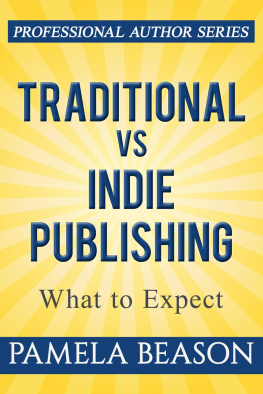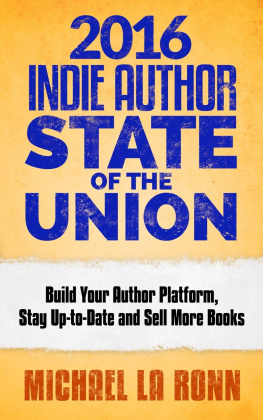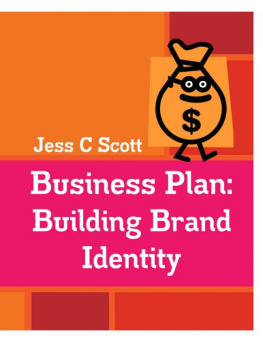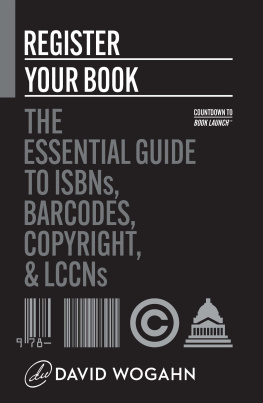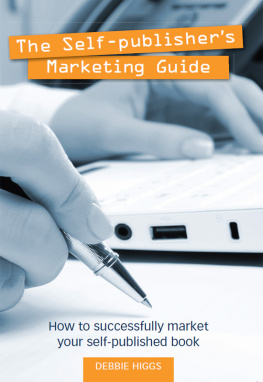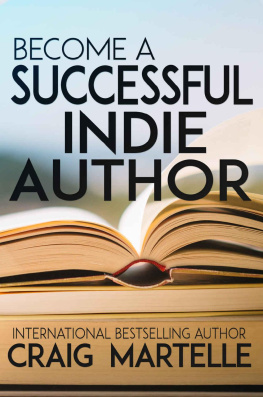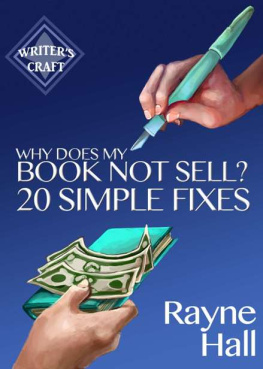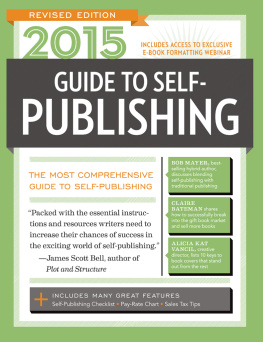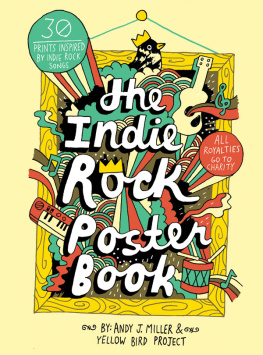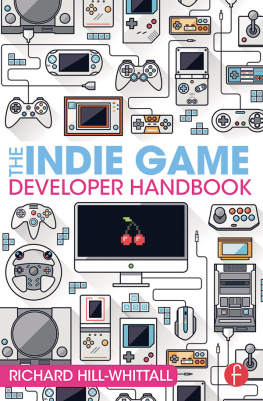Green
Light
Your
Book

Copyright 2016 by Brooke Warner
All rights reserved. No part of this publication may be reproduced, distributed, or transmitted in any form or by any means, including photocopying, recording, digital scanning, or other electronic or mechanical methods, without the prior written permission of the publisher, except in the case of brief quotations embodied in critical reviews and certain other noncommercial uses permitted by copyright law. For permission requests, please address She Writes Press.
Published 2016
Printed in the United States of America
ISBN: 978-1-63152-802-6
E-ISBN: 978-1-63152-803-3
Library of Congress Control Number: 2016930397
Cover design by Julie Metz Ltd./metzdesign.com
Interior design by Tabitha Lahr
For information, address:
She Writes Press
1569 Solano Ave #546
Berkeley, CA 94707
She Writes Press is a division of SparkPoint Studio, LLC.
Five Shades of Book Discovery, by Andrew Rhomberg, was originally published at DigitalBookWorld.com and is reprinted by permission of DBW and the author.
To my fellow She Writes Press authors, trailblazers all of you.
Contents
Introduction
I n late 2010, I was coming up on my ten-year anniversary in the publishing industry. Id worked for two houses, one a small, family-run press with a couple of best sellers under its belt, the other an indie darling struggling to maintain its identity in the wake of having been gobbled up two separate times in less than ten years by bigger, corporate publishing houses. I loved my job working for the indie darling, but it was also depressing to witness how our corporate parent was diluting the presss very indie-ness in its push to make it more mainstream. It was a slow morph, but deliberate, and my mandate from up top was clear: be more commercial.
If you dont know what it means to be more commercial, then bless you. But by the time youre finished with this book, you will know, and you will understand why whats most important in determining whether you get a book deal from a traditional house has nothing to do with how good your book actually is and everything to do with how commercial your book (and by extension you, your idea, your vision, your brand) is or has the potential to be.
I remember the book I had to reject that was the final straw in my traditional publishing career. Its less important what the subject matter was and more that it was a book that needed to be published. It was cutting edge and important, and its message was different from anything else our imprint had published into that category. I was disappointed by the no that was handed down, and my boss could see it on my face. She paused and made me a thoughtful offer: I could acquire it. Id been there long enough and had money in the bank, so to speak, but if it didnt work (i.e., at least earn out its advance), the failure would be on me.
Considering the statistic that 97 percent of all books fail (meaning they dont earn out said advance), you can imagine where my mind went. Could this little book defy the odds and be the 3 percent? What kind of money would I have to offer to ensure that the book earned out? And if I made a lowball offer to cover my bases, what message would that send to the author, or to my own entire company, for that matter? I was stuck. A good offer put me in a vulnerable position, and a low offer put me in a somewhat more vulnerable position. So I chickened out. Or maybe I realized the clock was ticking for me and that I wasnt going to last in traditional publishing much longer.
Later that week, I made a bid on another book I had far less passion for. Its not so important what the subject matter of that book was, either, but it was a book that did not need to be published. It offered nothing new. It would be going into a crowded shelving category, but its message was packaged and tied with a pretty little bow. The author had a celebrity connection and a big-shot agent. I was not elated when I got the go-ahead to make the offer. Though it was the biggest offer I had ever made in my publishing career, I was deflated by the fact that this honor was going to this particular book, and that for this reason it would be forever set apart from anything else Id acquired during my ten-plus years in book publishing.
These two experiences ushered in the end of my traditional publishing career. My faith in traditional publishing as the shaper and keeper of all our culture holds dear had been eroding for some time. I sometimes wondered what an acquiring editor whod come of age at Random House or Simon & Schuster in the 1930s and 40s would have thought of all the reality-TV tiein books being put out now by these two houses, which once published literary icons like William Faulkner, James Joyce, and Laura Z. Hobson. And this isnt about snobbery; for me, its about how far publishers have moved away from publishing what matters and toward publishing what sells.
Despite that big revelation, I cant say I blame them. Publishing houses are businesses. Are we allowed to begrudge them their effort to make a profit? Maybe, but lets not. Lets cut them some slack. However, if we know that their models are about money, and data-driven to the extent to which they can be, and all about assessing author platform (which Ill write about extensively in ).
But back to my story of leaving traditional publishing, which finally happened in 2012, just as that book Id made such a big offer on was going into production. I waited more than a full year after passing on the book I really wanted to acquire as I tried to figure out what my next steps were going to be. By late 2011, it was clear that I would stay in publishing, but I wanted to leave for something I could stand behind. I wanted to start a publishing company that allowed me to say yes to those books I was having to reject, books that rested on their laurels but didnt necessarily come with celebrity endorsements. The company I envisioned would publish books based on their merit alone, and it wouldnt matter whether they were commercial or whether the author had a platform. And so, in 2012, I cofounded She Writes Press with Kamy Wicoff, founder of SheWrites.com. It was shaped and formed within the parameters that drew me to publishing in the first place, as well as a little bit in response to traditional publishing. And while I dont in any way have it out for traditional publishing, it wouldnt be honest to say Im not disappointed by what its become.
Kamy and I started what we call a hybrid publishing company, where the authors invest in their own work up front for a higher percentage of the profits on the tail end. And while we are what the industry calls author-subsidized, She Writes Press is not a self-publishing company, and the authors who publish with us are not self-published authors. In the years since She Writes Press launched, Ive gone head-to-head with some of the biggest players in the traditional space in an effort to explain what we are doingand also why its necessary. And we are not alone. There are many other nontraditional models like ours, and countless indie authors whove co-opted a label that once belonged to small, independent (but traditional) publishing houses. And I say more power to them, because the indie-author movement has gained so much traction that self-publishing (or paying to publish in general) has gone from being stigmatized to earning legitimacy through proven gains.
Yet we have not fully arrived. The playing field is not level yet. The rise of self-publishing has led the industry to realize two things about self-published authors: 1) its not going to get rid of them; and 2) theres money to be made off them. Because there exist two separate campsthe traditionally published authors and everyone elsethose of us who fall into the everyone else category will be taken advantage of and undervalued unless we advocate for ourselves and also learn how to subvert the system while working within it (which is the focus of ).
Next page

